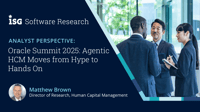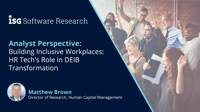The learning management system (LMS) market is evolving, with the lines that once rigidly defined categories becoming increasingly blurred. Today, an LMS that lacks Learning Experience Platform (LXP) capabilities risks becoming obsolete in an environment where user expectations are shifting rapidly. In a similar vein, an LMS and LXP that fail to harness the power of artificial intelligence (AI) to guide learners through their diverse learning journeys face a similar fate.
Read More
Topics:
Human Capital Management,
Employee Engagement,
Learning Management,
Employees & HCM - Business & Technologies
I recently attended the Oracle Apps & Industry Analyst Summit in Redwood City, California. Over the course of two days, Oracle offered a concentrated look at a market that is both racing ahead and tripping over its own shoelaces. Generative, predictive and now agentic artificial intelligence (AI) have become the new currency of competitive advantage across HCM; Oracle alone has delivered more than 150 AI capabilities across its Fusion Apps and 62 inside HCM in just two years, climbing from...
Read More
Topics:
Human Capital Management,
Employee Engagement,
Learning Management,
Talent Management,
Workforce Management,
Payroll Management,
Total Compensation Management,
Employees & HCM - Business & Technologies
Turnover rates have taken center stage in workforce discussions, often being the first metric leaders request when assessing the state of the workforce. Yet, in isolation, turnover is one of the least understood indicators we have. Relying solely on turnover is like driving a vehicle using only your side and rearview mirrors; you’re reacting to what has already happened, without a clear view of what lies ahead. While turnover shows us that employees are leaving, it doesn’t reveal why they’re...
Read More
Topics:
Human Capital Management,
Learning Management,
Talent Management,
Workforce Management,
Payroll Management,
Total Compensation Management,
employee experience
HR software for HCM is supposed to be the great enabler of a better employee experience. It promises to streamline processes, create seamless engagement and elevate the workplace into something dynamic, personalized and intuitive. Yet, for many organizations, the reality is far from the promise. Instead of making work better, HR software often becomes a tangled web of disconnected tools, frustrating interfaces and rigid automation that strip away the human element. As we progress through 2025,...
Read More
Topics:
Human Capital Management,
Learning Management,
Talent Management,
Workforce Management,
Payroll Management,
Total Compensation Management,
employee experience
Workforce planning has long been a cornerstone of business strategy, yet many enterprises still approach it with outdated methods. Traditionally, it has been rigid, reactive, subjective and often siloed. But as industries evolve—especially those with high turnover and a large frontline workforce, like retail, healthcare and hospitality—companies must rethink how they forecast talent needs. Technology is reshaping workforce planning, making it more dynamic, precise and forward-thinking.
Read More
Topics:
HCM,
Human Capital Management,
Employee Engagement,
Learning Management,
Talent Management,
Workforce Management,
Total Compensation Management
Attending isolved’s first Analyst Summit was more than just an opportunity to hear about their latest innovations—it was a front-row seat to their vision for the future of HR technology and services. A central theme emerged quickly—they are deeply committed to supporting small and mid-sized businesses (SMBs), not just with technology but also with robust services and an ecosystem of partners that elevate HR teams into the strategic powerhouses they were always meant to be.
Read More
Topics:
Human Capital Management,
Employee Engagement,
Learning Management,
Talent Management,
Workforce Management,
Payroll Management,
Total Compensation Management
If you’ve ever held the same job title at two different companies, you know firsthand how misleading job-based approaches to work can be. I’ve had the same title across different organizations, and the roles couldn’t have been more different. The responsibilities, expectations and even the skills required varied so significantly that it made me question why we continue to define work through the lens of static job descriptions.
Read More
Topics:
Human Capital Management,
Learning Management,
Talent Management,
Workforce Management,
Total Compensation Management,
employee experience
If you’re an HR professional, the term “API” might make you want to hand things off to IT and move on with your day. After all, you’re here to focus on people, not tech jargon, right? But here’s the thing—APIs play a major role in making sure your HR technology works for you. And no, you don’t need to be an engineer to understand why they matter.
Read More
Topics:
Human Capital Management,
Learning Management,
Talent Management,
Workforce Management,
Payroll Management,
Total Compensation Management,
employee experience
The HCM market has undergone a significant transformation in recent years. Legacy providers, long the dominant force, built their platforms primarily for administrative efficiency—streamlining HR processes but often overlooking the broader employee experience. However, today’s workforce expects more. Employees and managers now demand intuitive, engaging and connected HR experiences that extend beyond transactional tasks.
Read More
Topics:
Human Capital Management,
Employee Engagement,
Learning Management,
Talent Management
Technology should be viewed as an enabler of program success for diversity, equity, inclusion and belonging, providing extended support that enables teams to expand their reach and ability to execute more complex business processes. AI-powered recruiting platforms, for example, help remove bias from the hiring process by analyzing job descriptions and identifying language that may unintentionally deter diverse candidates. Tools that utilize algorithms to parse and review resumes can prioritize...
Read More
Topics:
Human Capital Management,
Learning Management,
Talent Management,
Workforce Management,
Payroll Management,
Total Compensation Management,
employee experience




















